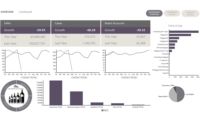Report: How today’s supply chains elevate through digitalization
This study provides insights into trends and technologies dramatically impacting supply chains and the people who run them.

Investment in supply chain innovation is at a critical inflection point, with a trend of declining investment from 2015 to 2018 being more than countered by a 95% increase in projected spending for 2019, according to a report released by MHI, the Charlotte, N.C.-based producer of the ProMat tradeshow that’s currently taking place.
The 2019 MHI Annual Industry Report, titled “Elevating Supply Chain Digital Consciousness,” provides insights into trends and technologies dramatically impacting supply chains and the people who run them.
The survey results suggest that:
- 57% of respondents are planning new technology investments totaling more than $1 million over the next two years (up 10% over last year’s survey).
- 34% plan to spend more than $5 million.
- 22% plan to spend more than $10 million.
- Eight in 10 survey respondents believe digital, next-generation supply chains will be the predominant model with just 5 years.
- The top technologies for disruption entail robotics and automation (64%), predictive analytics (59%), artificial intelligence (55%), Internet of Things (52%) and driverless vehicles and drones (51%).
- The Top 3 barriers to adoption include hiring qualified workers (65%), customer demands for lower pricing (56%) and customer demands for faster response times (54%).
- The top skills to remain competitive are analytics/modeling/visualization (40%), strategic problem solving (37%) and general business/cross-functional knowledge (31%).
Stages of digital adoption
The report defines a pyramid of digital adoption that has four technology stages, starting with digital connectivity (the collection of data through blockchain, cloud computing and more), automation (robotics, wearables, autonomous vehicles and more), advanced analytics (inventory optimization, for example) and artificial intelligence.
The report also includes a Supply Chain Digital Consciousness framework, developed by MHI and Deloitte, New York, to help organizations understand their current level of digital adoption and then identify gaps and next steps to boost digital consciousness and supply chain performance.
An assessment tool is included to help companies measure where they are on their digital adoption journey via a Supply Chain Digital Consciousness Index (DCI).
The DCI measures progress along the five digital categories:
- Leadership
- Innovation/technology
- Customer engagement
- Talent
- Workplace environment
The report also provides real-world case studies of digital supply chain technologies and recommendations for leaders for developing strategies to implement these innovations.
The findings in this report are based on survey responses from over 1,000 manufacturing and supply chain industry leaders from a wide range of industries. Nearly 60% of respondents hold executive-level positions such as CEO, vice president, general manager or department head. Participating companies range in size from small to large, with 59% reporting annual sales in excess of $100 million and 10% reporting annual sales of $10 billion or more.
Looking for a reprint of this article?
From high-res PDFs to custom plaques, order your copy today!






